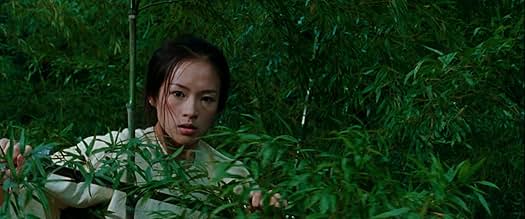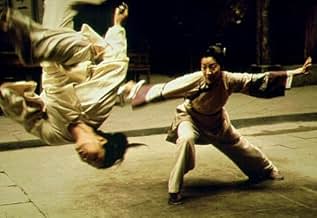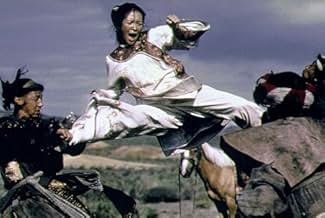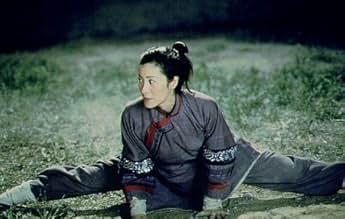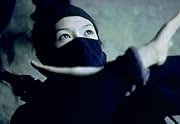In una terra di infinita bellezza e di leggende, una spada antichissima e preziosa fa incrociare i destini di un guerriero, della donna che lo ama, di un fuorilegge e di una principessa dest... Leggi tuttoIn una terra di infinita bellezza e di leggende, una spada antichissima e preziosa fa incrociare i destini di un guerriero, della donna che lo ama, di un fuorilegge e di una principessa destinata a diventare un guerriero.In una terra di infinita bellezza e di leggende, una spada antichissima e preziosa fa incrociare i destini di un guerriero, della donna che lo ama, di un fuorilegge e di una principessa destinata a diventare un guerriero.
- Regia
- Sceneggiatura
- Star
- Vincitore di 4 Oscar
- 101 vittorie e 132 candidature totali
Chow Yun-Fat
- Master Li Mu Bai
- (as Chow Yun Fat)
Ziyi Zhang
- Jen
- (as Zhang Ziyi)
Pei-Pei Cheng
- Jade Fox
- (as Cheng Pei-Pei)
Deming Wang
- Tsai
- (as Wang De Ming)
Suying Huang
- Auntie Wu
- (as Huang Su Ying)
Jinting Zhang
- De Lu
- (as Zhang Jin Ting)
Jianhua Feng
- Gou Jun Sinung
- (as Feng Jian Hua)
Zhenxi Du
- Shop Owner
- (as Du Zhen Xi)
Cheng Lin Xu
- Captain
- (as Xu Cheng Lin)
Recensioni in evidenza
What people who aren't Chinese and who don't know much about Chinese culture fail to understand, is that the warrior mythology portrayed in films like Crouching Tiger, Hidden Dragon and Hero has its roots in a particular genre of fiction that has been around much longer than television or film.
Having grown up reading a bunch of these stories of epic fantasy, I remember being surprised when I went to watch CTHD in the theaters, and saw the audience break out in laughter at the flying stunts. I suppose the concept probably does seem ridiculous to foreigners.
The whole deal with the flying is this:
In the stories, the world of "Giang Hu" mentioned in CTHD is the unconventional part of society in which the characters that practice high transcendent martial arts exist. "Giang Hu" literally translates to something like "lakes and rivers", which kind of is a cultural allusion to the fact that most of these people wander a whole lot participating in great duels of swordsmanship and all kinds of tragic drama.
One of the forms of transcendent martial arts is "chin guon", which translates to something like "the art of lightness". It's a skill that these warrior folk develop from a young age using various methods that make it so they can move as if they were light as a feather. I think the idea is that they're trained so that they progressively have less and less of a perception of their own weight, and thus they can run up walls and fly across rooftops in style.
There's another type of martial art which involves transmitting "chi" (spiritual essence or whatever you want to call it) through your hands or fingertips and into the pressure points of others, either doing them harm, rendering them unable to move, or restoring some of their strength.
If you don't understand that it's another culture's fiction/mythology and can't get over that it defies known physics and medicine etc., well, too bad.
At the same time, look at acupuncture. Millions swear by the benefits of acupuncture. Hell, my father had a stroke that paralyzed half his face and went to four separate doctors. They couldn't do a damn thing. He then went to an acupuncturist and after two sessions the paralysis was gone. Conventional medicine still has no idea how acupuncture could possibly work, yet a lot of doctors will accept it as a viable option. Who the hell knows, maybe once upon a time in China people could fly.
I find Chinese warrior mythology pretty interesting, and the problem is that these novels do not translate well. I'm not sure if anyone has ever tried. A lot of what goes on in them has a lot of cultural relevance and wouldn't be readily understood by certain people who have Western sensibilities. Hong Kong and Taiwan have for a couple of decades produced a lot of television shows that portray these stories, but they're mostly pretty cheesy like American soap operas.
Which is why CTHD is semi-important as a film. It's the first film to expose a lot Americans to this facet of Chinese mythology, and I hope it's not the last.
Having grown up reading a bunch of these stories of epic fantasy, I remember being surprised when I went to watch CTHD in the theaters, and saw the audience break out in laughter at the flying stunts. I suppose the concept probably does seem ridiculous to foreigners.
The whole deal with the flying is this:
In the stories, the world of "Giang Hu" mentioned in CTHD is the unconventional part of society in which the characters that practice high transcendent martial arts exist. "Giang Hu" literally translates to something like "lakes and rivers", which kind of is a cultural allusion to the fact that most of these people wander a whole lot participating in great duels of swordsmanship and all kinds of tragic drama.
One of the forms of transcendent martial arts is "chin guon", which translates to something like "the art of lightness". It's a skill that these warrior folk develop from a young age using various methods that make it so they can move as if they were light as a feather. I think the idea is that they're trained so that they progressively have less and less of a perception of their own weight, and thus they can run up walls and fly across rooftops in style.
There's another type of martial art which involves transmitting "chi" (spiritual essence or whatever you want to call it) through your hands or fingertips and into the pressure points of others, either doing them harm, rendering them unable to move, or restoring some of their strength.
If you don't understand that it's another culture's fiction/mythology and can't get over that it defies known physics and medicine etc., well, too bad.
At the same time, look at acupuncture. Millions swear by the benefits of acupuncture. Hell, my father had a stroke that paralyzed half his face and went to four separate doctors. They couldn't do a damn thing. He then went to an acupuncturist and after two sessions the paralysis was gone. Conventional medicine still has no idea how acupuncture could possibly work, yet a lot of doctors will accept it as a viable option. Who the hell knows, maybe once upon a time in China people could fly.
I find Chinese warrior mythology pretty interesting, and the problem is that these novels do not translate well. I'm not sure if anyone has ever tried. A lot of what goes on in them has a lot of cultural relevance and wouldn't be readily understood by certain people who have Western sensibilities. Hong Kong and Taiwan have for a couple of decades produced a lot of television shows that portray these stories, but they're mostly pretty cheesy like American soap operas.
Which is why CTHD is semi-important as a film. It's the first film to expose a lot Americans to this facet of Chinese mythology, and I hope it's not the last.
Crouching in the shadows, hiding in the dark, entangled with emotion, an unobtrusive heart, waiting for a moment that may never be revealed, the chance to draw back shades, unlock its passions, remove its seals.
Seamlessly flowing like water over weathered stone, as elegant and enchanting a tale of right verses wrong, good verses bad, learning and forgiving as you'll likely find. The cinematography is sublime, the acting and performances as good as they get, the message as simple as any placed on a screen. Immerse yourself in a truly wonderful piece of cinema that perpetually stands the test of time.
Seamlessly flowing like water over weathered stone, as elegant and enchanting a tale of right verses wrong, good verses bad, learning and forgiving as you'll likely find. The cinematography is sublime, the acting and performances as good as they get, the message as simple as any placed on a screen. Immerse yourself in a truly wonderful piece of cinema that perpetually stands the test of time.
I just saw this film today. I was totally captivated... when it was all over, and the credits began to run, it took me a couple of seconds to realize where I was. I didn't want to get out of my seat. And once I got out of the theatre, I couldn't even talk about it for an hour or so. I kept running the details over and over in my head. It's rare that a film has such an impact on me. The cinematography was stunning. The special effects were beautifully done. The characters' moves were effortless. The acting was wonderful. I really think that Michelle Yeoh should have been nominated for an Oscar for Best Actress. I thought that the effects and storyline complimented each other brilliantly. There were so many different layers to the plot. There were many things that couldn't be explained with dialogue that were expressed in the characters' faces. This film had lighthearted moments, heartwrenching moments, romantic interludes, inspirational sentiments, wonderful plot twists, superb acting, beautifully done fight scenes, never before seen special effects...it had it all. Some scenes may have been a little over the top, but it's *fantasy*... and yet, after a few brief moments, it somehow became completely believable. That's how much this film draws you in. This is a one of a kind film; there is just no comparing it to any other. It transports you to another place and time. I highly recommend it.
As Ang Lee, I grew up reading wuxia novels in Taiwan. Those novels usually mixed engrossing history, thrilling action, enchanting romance. But when these novels were made into movies or TV series, none of them could match my imagination. It's either because of wrong casting, bad acting, tedious costumes, sloppy storytelling, minimal budget (so everything is shot in studio rather than in the grand Chinese landscapes as they were told in books), fake action... I could go on and on. Now Ang Lee finally made a wuxia film that captures my imagination and fulfills my dream of childhood.
The casting of CTHD is perfect. No disrespect to Jet Li, but Jet Li would not make Li Mu Bai into what he should be: noble, wise but weary. Chow Yun Fat conveys the unspoken feelings of Li Mu Bai in a way I can't imagine anyone else can. But he's known for his acting, Michelle Yeoh was known for her fighting skills. Here in CTHD, she proves herself as an excellent dramatic actress. The secrete longing for Li and the confusion of Li's true feelings were clearly conveyed by her eyes. The scenes between them are heartbreaking. Zhang Zi Yi is a true discovery! What a wonderful talent to steal scenes after scenes from the veterans around her. She ran from looking innocent, haughty, feisty to loving and distraught. She made the complex Jen a real flesh and blood believable human being. Chang Chen made a perfectly sexy and charming bandit.
The scenery and the photography was beyond belief. The majestic landscapes of China match my imagination when I read all the beautiful Chinese poems of the Tang and Sung dynasties. No wonder those poets could come up with those masterpieces. They sure had the best inspiration. Peter Pau not only captured the landscapes and the settings, he also managed to capture the fast-as-lightening action wonderfully. The shot of Jen gliding over water just lodged in my mind. The soundtrack is also excellent. Tan Dun used different instruments to match the different locales. He mixed in Central Asian music in the desert sequence and Chinese flute in the Southern China scenes. Yo-yo Ma's cello in the main theme makes me want to weep everytime I hear it.
The storytelling was also done expertly. As a romantic-at-heart, I love the desert romance between Jen and Lo. It's one of the most charming and believable love stories that I can remember. Most people gave credit of the fighting to Yuen Wo Ping. I'd give kudos to Ang Lee. I've seen Yuen's martial art films before, but they're never done in such an imaginative and artistic way. The artistic vision has to come from Ang Lee.
To sum it up, three cheers for Ang Lee! You not only fulfilled your childhood dream, you fulfilled mine too. It's such a pleasure to finally see a wuxia novel be done right. Thank you! Thank you! Thank you!
The casting of CTHD is perfect. No disrespect to Jet Li, but Jet Li would not make Li Mu Bai into what he should be: noble, wise but weary. Chow Yun Fat conveys the unspoken feelings of Li Mu Bai in a way I can't imagine anyone else can. But he's known for his acting, Michelle Yeoh was known for her fighting skills. Here in CTHD, she proves herself as an excellent dramatic actress. The secrete longing for Li and the confusion of Li's true feelings were clearly conveyed by her eyes. The scenes between them are heartbreaking. Zhang Zi Yi is a true discovery! What a wonderful talent to steal scenes after scenes from the veterans around her. She ran from looking innocent, haughty, feisty to loving and distraught. She made the complex Jen a real flesh and blood believable human being. Chang Chen made a perfectly sexy and charming bandit.
The scenery and the photography was beyond belief. The majestic landscapes of China match my imagination when I read all the beautiful Chinese poems of the Tang and Sung dynasties. No wonder those poets could come up with those masterpieces. They sure had the best inspiration. Peter Pau not only captured the landscapes and the settings, he also managed to capture the fast-as-lightening action wonderfully. The shot of Jen gliding over water just lodged in my mind. The soundtrack is also excellent. Tan Dun used different instruments to match the different locales. He mixed in Central Asian music in the desert sequence and Chinese flute in the Southern China scenes. Yo-yo Ma's cello in the main theme makes me want to weep everytime I hear it.
The storytelling was also done expertly. As a romantic-at-heart, I love the desert romance between Jen and Lo. It's one of the most charming and believable love stories that I can remember. Most people gave credit of the fighting to Yuen Wo Ping. I'd give kudos to Ang Lee. I've seen Yuen's martial art films before, but they're never done in such an imaginative and artistic way. The artistic vision has to come from Ang Lee.
To sum it up, three cheers for Ang Lee! You not only fulfilled your childhood dream, you fulfilled mine too. It's such a pleasure to finally see a wuxia novel be done right. Thank you! Thank you! Thank you!
Chinese martial arts films had found a market in the West during the Kung Fu boom initiated by Bruce Lee in the early 1970s
But "Crouching Tiger, Hidden Dragon" represents a new departure, an attempt to produce a sophisticated, big-budget Chinese film that would appeal both to mainstream Western audiences and to audiences in the Far East
Through their quest to find the stolen sword of Green Destiny, warriors Yu Shu Lien (Michelle Yeoh) and Li Mu Bai (Chow Yun-Fat) explore themes of love, loyalty and sacrifice
Ang Lee was an astute choice as director The location shooting was on the Chinese mainland and the actors came from Malaysia, Hong Kong and Taiwan, as well as China Instead of the Shaolin school of martial arts favored by Bruce Lee, Ang Lee opted for the more spiritual form of Wudan; brute force is replace by scenes of balletic grace as opponents climb up walls or flit through tree-tops
The widespread success of the film is a firm indication that Chinese culture is making its mark
Ang Lee was an astute choice as director The location shooting was on the Chinese mainland and the actors came from Malaysia, Hong Kong and Taiwan, as well as China Instead of the Shaolin school of martial arts favored by Bruce Lee, Ang Lee opted for the more spiritual form of Wudan; brute force is replace by scenes of balletic grace as opponents climb up walls or flit through tree-tops
The widespread success of the film is a firm indication that Chinese culture is making its mark
Lo sapevi?
- QuizMichelle Yeoh deliberately did not work for a year before filming began so she could concentrate on training and learning Mandarin.
- Blooper(at around 1h 30 mins) During the fight between Yu Shu Lien and Xiou Long, many floor tiles are smashed by Shu Lien. After Shu Lien discards her heavy metal weapon and continues to fight, the tiles appear intact.
- Curiosità sui creditiThe opening title appears in Chinese and English.
- Versioni alternativeAn English dubbed version was created for the home video market.
- Colonne sonoreA Love Before Time
Music Composed by Jorge Calandrelli, Dun Tan
Lyrics by James Schamus, Elaine Chow (Translation)
Performed by Coco Lee featuring Cello Solo by Yo-Yo Ma
Coco Lee appears courtesy of Sony Music Entertainment (Holland) B.V.
I più visti
Accedi per valutare e creare un elenco di titoli salvati per ottenere consigli personalizzati
Dettagli
- Data di uscita
- Paesi di origine
- Sito ufficiale
- Lingue
- Celebre anche come
- El tigre y el dragón
- Luoghi delle riprese
- Aziende produttrici
- Vedi altri crediti dell’azienda su IMDbPro
Botteghino
- Budget
- 17.000.000 USD (previsto)
- Lordo Stati Uniti e Canada
- 128.530.421 USD
- Fine settimana di apertura Stati Uniti e Canada
- 663.205 USD
- 10 dic 2000
- Lordo in tutto il mondo
- 213.978.518 USD
- Tempo di esecuzione2 ore
- Colore
- Mix di suoni
- Proporzioni
- 2.39 : 1
Contribuisci a questa pagina
Suggerisci una modifica o aggiungi i contenuti mancanti


